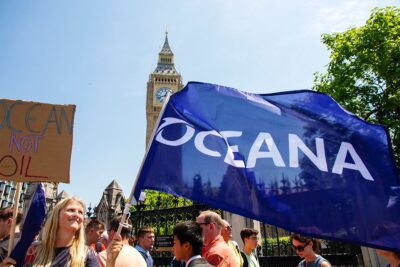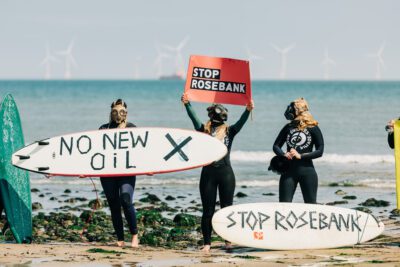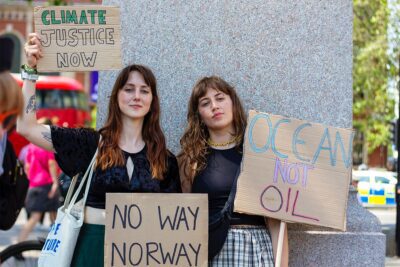June 10, 2023
Wave of resistance builds against offshore oil and gas
Today we stood shoulder to shoulder with people across the nation to tell the UK government: No more oil and gas, stop destroying marine life and fuelling the climate crisis.
The Rosebank oil field currently under consideration contains 500 million barrels of oil, which – if burned – would generate more CO2 than the combined annual emissions of the world’s 28 low-income countries.

To develop it, the Norwegian company Equinor plans to run a gas pipeline directly through the Faroe-Shetland Sponge Belt, a Marine Protected Area. This would threaten an enormous variety of marine life on the seabed, including the endangered quahog clam, one of the longest-lived animals known to man that can live for up to 500 years.
Rare deep-sea sponges and cold-water corals, which form vital nurseries for many fish species, could also be harmed by the development, along with the UK’s populations of whales and dolphins.
On top of these impacts, a major oil spill from Rosebank would risk serious damage to at least 16 UK Marine Protected Areas, research has shown. But it is not just these large oil disasters that are a threat. Smaller, routine spillages from similar developments are already polluting the UK’s seas on a daily basis. Whales, dolphins and seabirds – including some of Britain’s most endangered species and habitats – are subject to an unending flow of this ‘chronic oiling’.

To lower bills and improve energy security we need a fair transition to renewables that can provide low-cost energy and long-term jobs. More oil and gas will only lock us into a dying industry that is leading to a dying planet.
Today, from Shetland in the far North to Penzance on the Cornish coast, people took to the sea in boats, kayaks, paddleboards and diving gear, as well as local beaches, to protest against Rosebank.
In Aberdeen, surfers and kayakers paddled out to sea and left messages in the sand, while in Penzance a group of divers held an underwater ‘Stop Rosebank’ photoshoot. We were in London, with boats sailing up the Thames past Westminster and a gathering of crowds in Parliament Square.
 The strength of feeling is clear. Three quarters of the British public are opposed to drilling in marine protected areas, according to a YouGov poll this year. That’s because we know damage it will do to our climate and the UK’s extraordinary marine life.
The strength of feeling is clear. Three quarters of the British public are opposed to drilling in marine protected areas, according to a YouGov poll this year. That’s because we know damage it will do to our climate and the UK’s extraordinary marine life.
When Energy Secretary Grant Shapps makes his decision on whether to approve Rosebank he too should be thinking of the future, of the need to protect our seas and safeguard of climate.

